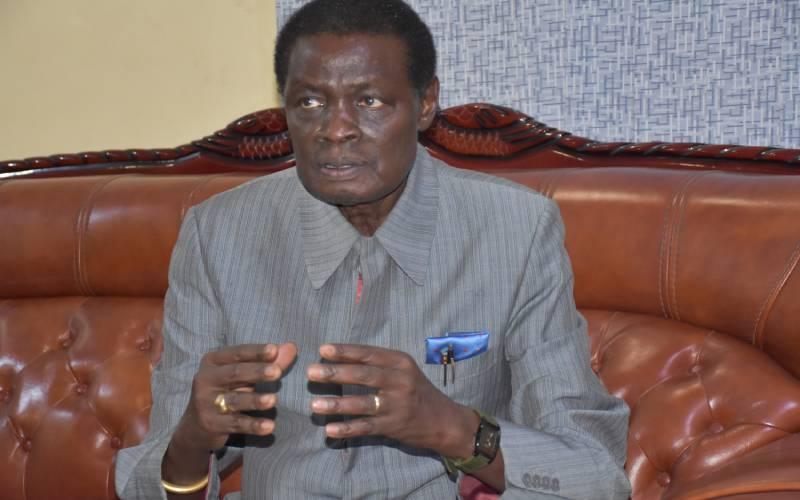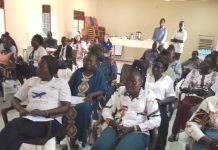Africa-Press – South-Sudan. For the last twelve years, Ambassador Steven Kiliona Wondu has been at the helm of National Audit Chamber of South Sudan as the country’s Auditor General, ensuring continuity and stability even in the face of 2013 and 2016 crises.
But on July 12, 2022, Wondu was appointed the chairperson of the Audit Commission of the East African Commission that brings together six other Auditors-General from the partner states.
In this exclusive interview, Amb Wondu spoke to KEVIN OGUTU about the challenges in auditing government books of accounts in South Sudan, his personal East Africa Community dreams that he hopes will be realized in his lifetime and why in his one-year rotational stint as the Chairperson of the Audit Commission, he intends to start performance audit for EAC organs and institutions.
Ogutu:
This is no doubt the first interview you have granted since your appointment. How does this new status in East Africa Community make you feel?
Amb. Wondu:
This is a great honour to me as a person to be appointed into this position. This is also a great honour to my country that is South Sudan and a reaffirmation of the regional bloc to work with South Sudan. This position means that I have been entrusted to organize these high level deliberations, designing audit procedures to be done jointly with my colleagues from the six other countries I will be sitting with in the same commission.
Ogutu:
Recent audit reports have raised queries on management of funds by two EAC organs that is the East African Court of Justice (EACJ) and the East African Legislative Assembly (EALA). What do you say about these as you embark on your new roles?
Amb. Wondu:
The work of the Audit Commission is to do the audit, present the analysis together with the recommendations in a jointly fashion to the political organ. We submit it to the Legislative Assembly for analysis. Ultimately it is the Secretariat, which is the political wing of the organization that must act on the recommendations made.
Like any auditor, we will strive to do our part and make recommendations. As an independent commission, we can only do our part. We do not have the powers to implement the recommendations that we give. That is a prerogative of the Secretariat.
Ogutu:
You have been South Sudan Auditor-General for the past twelve years. When the country joined the EAC in 2016 you were occupying the same seat, meaning you understand pretty well what will be required of you as the chairperson of the Audit Commission.
Amb. Wondu:
That is true that I have been a member of the Audit Commission ever since my country joined EAC. The only difference is that now I will be the one chairing our joint meetings, coordinating between the Commission and the Secretariat, organizing audit teams, and planning on which institutions need to have their books of accounts audited at what time, etc.
I have been in these meetings before, courtesy of my position as the Auditor General of the Republic of South Sudan.
Ogutu:
While this is not a political office, do you have promises to make? Should we expect some things to be done differently or it is going to be business as usual?
Amb. Wondu:
What we decided upon on July 12, 2022, and which is something close to my heart is that we are going to embark on first ever performance audit. The East African Community (EAC) has three organs, that is the Secretariat, the East African Legislative Assembly (EALA) and the East African Court of Justice (EACJ). Apart from these, we have nine institutions engaged in various projects. We need to carry out performance audit of these institutions and the projects that they have been undertaking, visa vis the money that they have been given to execute the various projects.
Ogutu:
Why do you think this would be necessary?
Amb. Wondu:
We have to establish if these projects actually reach the people; if the institutions and the organs serve the very purpose that infirmed their creation. We will exclude the Secretariat from this performance audit but when it come to the other two organs and the nine institutions, then we must start asking the hard questions.
We have Civil Aviation Safety and Security Oversight Agency (CASSOA), yet we have seen aircrafts crushing from time to time. A performance audit of such institution will bring to the fore what is actually happening. If it is viable as an institution under EAC, or it should be done away with.
We have the East African Kiswahili Commission (EAKC) located in Zanzibar. We recently saw Uganda adopting Kiswahili as a national language and also directing that the language should be taught in primary and secondary schools. But that may not be all. Performance audit will shed light on these institutions, and the report submitted will be able to guide on the next course of action.
Ogutu:
South Sudan, which is your country and one that has made it possible for you to serve in this capacity in the EAC has had challenges satisfying her financial obligations according to the EAC Treaty that she signed. As we speak, there are reports that South Sudan has arrears in excess of $49 million. Don’t you think this now puts you in a pretty awkward situation?
Amb. Wondu:
My appeal to the government of South Sudan is that it should honor this obligation, pay up so that I can move around with dignity. As the chairperson of the Audit Commission I will be moving around the various countries on official duty. It will be a little awkward for me to make audit queries only for me to be reminded that my country has not paid up.
What I must tell the people of South Sudan and EAC is that there has been a demonstrated political goodwill by President Salva Kiir. In the recent past Finance Ministry released $100 million for payment of the obligations.
On July 8, 2022, EAC Secretary General Peter Mathuki, the EALA Speaker and some South Sudan members came to see the President, and through that alone we can see a serious commitment from the political side of the country.
This is a clear indication that everything else will fall into place.
Ogutu:
You have decried failure of cooperation by various government entities whenever you are conducting audit into their business accounts. In your compliance audit of the accounts of 2% and 3% share of net oil revenue of the oil producing states and communities, Bank of South Sudan for instance did not avail accounts of oil producing states. Is this still a serious challenge?
Amb. Wondu:
What troubles me at heart is our management, or mismanagement of resources. And here I mean the various aspects of it. On the revenue side, there is very little clarity on how the revenues are used. National Audit Chamber’s work is to audit and make our findings public. But we need reliable information to execute this. In most instances, that cooperation lacks. This frustrates the work of the Chamber no doubt and the outcome can never be conclusive.
Ogutu:
In every audit, whenever you give a report, you indicate recommendations that need to be taken, as well as the gaps that you established in the course of your investigations that require the input of other agencies like the police. Do you see follow ups after you have submitted your reports?
Amb. Wondu:
In an ideal situation, we would expect other institutions of the government to come in act. After the audit report with the recommendations and the gaps identified during the process, the implementation goes back to the executive, police CID anti-corruption commission and any other relevant body to check on the issues raised in the audit report.
The law divides responsibility. We can only play our part and leave other tasks to relevant institutions.
Ogutu:
Where do you see EAC in the future?
Amb. Wondu:
I want to see East Africa where there will be free movement of people and goods not just on paper, but on the ground as well. You can imagine somebody required to have a visa to move from Nimule (South Sudan side of the border) to Atyak (right across the border on the Ugandan side).
South Sudan does not have a robust manufacturing sector as we speak. But that does not mean we do not have the potential. I must tell our people that we have lots of opportunities. We can become ‘Ukraine’ and produce honey, fish and even meat products for export. With proper livestock management (where the cattle are produced scientifically) we can have exportable products to the region and beyond. And we already have a market as the East Africa to start with.
For More News And Analysis About South-Sudan Follow Africa-Press






